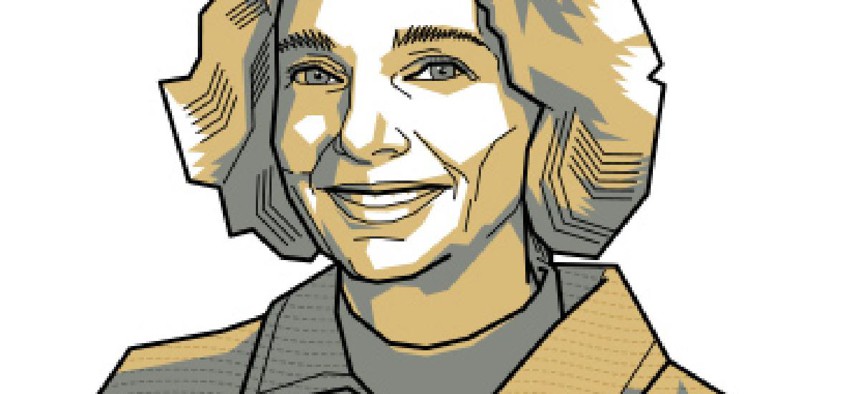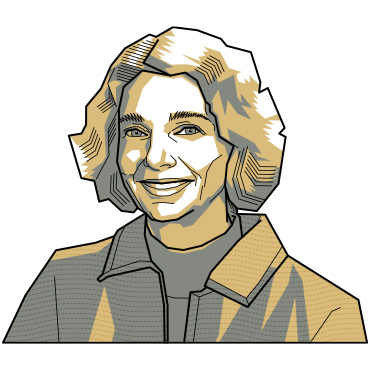Kathy Conrad: The exit interview

"It's not enough to just bring in smart, talented people. They need to work hand-in-hand with the many innovators and career leaders in government. And then to show quick wins."

For the last four years, seemingly every government-wide IT initiative has in some way involved Kathy Conrad, the principal deputy associate administrator of the General Services Administration's Office of Citizen Services and Innovative Technologies. The three-time Federal 100 winner's last day in government was July 24; she sat down with FCW Editor-in-Chief Troy K. Schneider on July 21 to discuss the lessons learned.
This interview has been edited for length and clarity.
Before we get to your departure, let's talk about your arrival. Why did you join GSA in the first place in 2011?
The mission and the scale of government are unparalleled. Having worked with and around government for my whole career, I had always wanted the opportunity to serve when the time was right -- and when, at least in my mind, the administration was leading initiatives that I felt would leave lasting positive impact.
Having that more-direct impact in improving how technology and digital services can enable more effective government and improve the lives of people we serve, that's a rare opportunity. It's really the most rewarding work I've ever done.
You've certainly worked on a wide range of projects in your four years. Are there any that stand out as your favorites, or that you think are going to have the greatest impact?
We've developed a remarkable portfolio of shared services and solutions that are enabling agencies to deliver on the Obama administration's commitment to open, citizen‑centered digital government. We've done Data.gov, the Digital Analytics Program, Challenge.gov, Search, DigitalGov.gov, Connect.gov, launched the Presidential Innovation Fellows program and 18F.
It was very clear when I got here in 2011 that there was tremendous untapped potential in open government and in open data. Since then, open data has really become one of the key principles of government, and is now being adopted all around the world. Data.gov now hosts 130,000 datasets from 80 different agencies along with the states, counties and some cities.
We're unleashing the power of open data to drive economic growth and improvement in society in key areas like health care, transportation, the environment, disaster recovery. Broader than that, we're developing software in the open. We are ensuring reuse, and building a stronger community of developers and designers as a result of that open source community.
That shift, to meet the changing expectations of citizens for transparency, accountability, and engagement, is now operationalized in a whole fleet of shared services and solutions, and they're based in policy.
A couple of the other things that I think are making a real difference: FedRAMP is really changing the landscape. Agencies are able to move to the cloud with a consistent, rigorous, reusable security authorization and assessment framework, which is now fully operational, and it's really demonstrating the benefits of a government-wide approach to cloud security.
I know people continue to believe that the FedRAMP process should be shorter and quicker. And it should be more efficient, and it will be more efficient. But we will never trade off speed for rigor. The heart of FedRAMP is trust, and trust is based on the rigor and consistency of the process.
I'm also excited to see what happens with Connect.gov, which is ready for takeoff as our newest high-impact shared service.
And are there other projects like Challenge.gov that haven't quite hit escape velocity yet, that you are hoping or expecting to get more traction over the next year?
I think one thing that will be really interesting is to pay attention to what's happening with USA.gov, and its transformation to a content management and digital service platform.
Just last month we launched a very robust content-management platform on USA.gov, and I don't mean just the website USA.gov. It's the whole family: The contact center, GobiernoUSA.gov, and Kids.gov. It is enabling USA.gov to evolve from what's really been a self-contained portal to a powerful, bilingual publishing platform for government agencies.
It will fulfill its promise as the front door of government and be able to consume content directly from agencies and then dynamically publish it on the USA.gov domain. It's very, very effective as a platform to amplify content from around the government.
Another one to keep an eye on is our Digital Analytics Program, which will soon be adding customer satisfaction data, to give us an even more complete view of the use and performance of federal websites.
That's quite a list. How much of your work is on new systems and actual technologies, and how much of it is about changing the culture and mindset in government?
Much of what I've done is to be a champion for change. I spent a lot of my time building awareness, interest and support for new ways of developing and delivering government services.
It's really important not just to offer new technologies, but to build receptivity and appreciation for how they can help government better meet the needs of its customer. Part of that is baking in an understanding of, what does that really mean? I think government can sometimes be so steeped in process that it's easy to lose sight of what we're trying to accomplish.
And so much of what your office does relies on persuading, not compelling. Are there things you've learned over the last four years about how to convince people to change when you don't have command authority?
I've felt like it's always better to offer carrots rather than sticks when you can, and frankly to listen, not to lecture. Having a collaborative, down‑to‑earth approach that's focused around delivering results works best.
Most people in government are here because they passionately believe in what they're doing. If you can tap into that mission focus and have people engaged in not only understanding what we're offering, or what the new way of doing things might be, but how it will help them be more successful.
That's been reflected with a lot of the staffing that's been done -- you've been recruiting change agents. But how do you make sure the changes outlast their champions? A lot of the most effective leaders are not planning to settle into government for the next 15 years.
We've found that the impact, the scale, and the mission of government are not only a powerful recruiting tool -- once here, there are plenty of talented people who are choosing to say. Look at Ryan Panchadsaram, who's now deputy CTO. Marina Martin, who's now the CTO at VA. They both started out as Presidential Innovation Fellows. And they're not alone.
But again, I think the real staying power depends on collaboration.
It's not enough to just bring in smart, talented people. They need to work hand-in-hand with the many innovators and career leaders in government. And then to show incremental results and quick wins.
As these new leaders come in, is there advice that you'd give them? Things you wish you had known before you first showed up at GSA?
I think I actually did this, but the most important thing is to really spend a lot of time listening and learning at the start -- to recognize the talents that already exist and learn from those people. I benefited tremendously from doing that.
I think one of the hardest things is to learn how to find that talent. Early participation in as many government-wide or agency-specific, not really just meetings, but groups that can help provide visibility and insight on the things that are already working. You need to learn how to tap into and leverage those rather than starting from scratch.
You've said you're going to take a real break before jumping into whatever's next. Are you doing anything fun this summer?
I am! My husband and I are riding our bikes from Jasper to Banff and Lake Louise, through the Canadian Rockies along the Icefields Parkway, which is supposed to be one of the 50 most spectacular bike rides anywhere.
And was this the last government job for you? Or might you cycle back into the public sector at some point?
I could certainly be lured back in the future. As I said, this has been inspiring and rewarding, and depending on the next administration ... that's hard to predict, but I wouldn't rule it out.
NEXT STORY: Roth grilled on contracting databases


